- Home
- Blake Banner
Powder Burn Page 6
Powder Burn Read online
Page 6
I wanted to tell him I didn’t know a nice way to uncover murdered bodies, but instead I said, “I have to call 911. Before I do, I need to ask you a question. Did they have laptops, papers, diaries…?”
“What is this?”
“Paul, did they?”
“They had laptops, yes, and each of them kept a diary. Why?”
“Their room upstairs?”
“Yes, but you can’t go up there!”
I held his eye a moment. I felt a grief I could not explain. I said, “Comfort your wife, Paul.”
I climbed the stairs. Their room was easy to find. The Peabodys had obviously respected their privacy. The room had been turned over, like Bran’s, probably a week earlier, but nobody had been in since. There were no diaries and no laptops, they had been taken, but there was a calendar on the wall, and I took that.
I stepped out of the room, closed the door, pulled my cell from my pocket and dialed 911.
SEVEN
Two patrol cars and an unmarked vehicle showed up, with an ambulance, a Crime Scene van and a car from the Medical Examiner’s department. The uniforms sealed off the house with yellow police tape and the crime scene team pulled on white, plastic suits and picked their way down to the wood pile, where they erected a kind of tent and started slowly and meticulously dismantling the pile of logs to reveal the bodies within.
The detective, Mo Novak, sat in the armchair opposite me and perspired. His face said it was too hot to think, and his almost spherical body said the laws of physics did now allow his shirt to stay tucked into his pants. The mystery was how his pants stayed up at all. He mopped the back of his neck with his folded handkerchief and looked at his notepad. Paul and Pip watched him from the sofa, holding each other’s hands.
“So, what are you doing here, Mr. Walker?”
“An acquaintance of mine was worried about her brother. She hadn’t heard from him in a while. He’s a student at Columbia. I asked around and they said he was a friend of Hans and Hattie. I came to ask if they had any news of him.” I gestured at the garden. “Mr. and Mrs. Peabody were very hospitable and offered me lemonade on the veranda. I couldn’t help noticing the flies…”
He looked at me as though I’d forced him to bite into a lemon. “The flies?”
I sighed, shrugged, and spread my hands. “I was in special operations in Afghanistan, Iraq, Colombia…” I pointed out at the garden. “They are blowflies. They are often found on dead bodies and animals. I’ve seen it many times and I recognized their behavior. You can often tell when there’s a body in undergrowth, or partially buried, because the blowflies become very active in one particular spot. They will buzz a lot and fly short distances, then return, rather than ranging, looking for food.”
They all three looked at me in a kind of horrified silence. Detective Novak said, “And you noticed this…”
“It was hard to miss, Detective. I was ten years with the SAS. I spent a lot of time in the desert and in jungles. You get a lot of flies there.”
“…Sure.”
“When Mr. and Mrs. Peabody said that they hadn’t heard from Hans and Hattie since Saturday 30th, I guess habit and instinct took over.”
“Habit and instinct…” His mouth hung open and his eyes narrowed.
I smiled without much humor. “We are the product of what we do, Detective. As soon as I discovered the bodies, I called 911.”
I held Paul’s eye, then Pip’s. I knew they were scared of me, and I regretted that, but there was nothing I could do about it, and the last thing I needed was Mo Novak lumbering all over Charlie’s disappearance. So I told them with my face to keep quiet, and they did.
“So who’s this kid, Charlie?”
“Carlos Vazquez, a student from Mexico. He’d been hanging out at the Mezcal with some friends. Word is he took off for Vegas for a few days to spend his big sister’s money. I figured I’d ask Hans and Hattie if they knew anything. They were friends.”
He pointed at the Peabodys and then at me, to and fro several times. “So you didn’t know each other before today.”
They shook their heads. “No, we have never met before.”
He frowned at me. “So, you don’t think there is any connection between your Mexican kid and the deceased…”
I made a face of doubt and shrugged. “That is your area of expertise, Detective, but apart from the fact that they occasionally drank at the same bar, I can’t see any connection. The fact that I found the bodies is a pure fluke. Given another day or two, somebody else would have. It was just a matter of time.”
I held their gaze again while he made notes and sweated. After a moment, he said, “I’m going to have to ask you to come to the 43rd and make a full statement.”
“Of course. Will tomorrow at eight AM suit you?”
“Sure, just let me have your contact details, will ya?”
I handed him my card. I looked at Pip, then at Paul. They were watching me carefully. I said, “I am very sorry. You are good people, you didn’t deserve this.” I waited a beat, then added, “I know whoever did this will be caught, and punished.”
Detective Mo Novak of the 43rd watched me stand. He looked troubled. He hadn’t told me I could leave, but he didn’t need me anymore so he couldn’t stop me. He said, “Don’t leave town, Mr. Walker.”
I smiled at him. “I don’t plan to, Detective.”
I left the room and made my way out to my car. The shadows were stretching long across the road. I leaned on the roof of the Zombie, pulled my Camels from my pocket and lit one with my old, battered Zippo. As I took the first drag and let out the smoke, I scanned the road ahead of me. The dark blue Audi was still there. I thought briefly about killing the driver and his friend, but it didn’t make a lot of sense. Neither did losing them. That would just alert them to the fact that I was aware of their presence, and it wouldn’t take them long to pick me up again. I figured I’d reel them in slow, and when I was ready, I’d ask them a few questions.
But not yet.
I got behind the wheel and made my way slowly back up Soundview toward the Bruckner Expressway. I planned to have a look in Charlie’s apartment, and I wanted these guys to see me do it.
Twenty minutes later, I pulled up outside number 12 on E 126th Street. This time I didn’t climb the steps to the front door. I went down to the basement, rang on the bell, and hammered on the wood, like a real cop. Mrs. Manager opened the door with huge eyes staring at me through her bottle-base glasses.
“You,” she said, and then, “You again.”
I handed her my homemade search warrant and showed her my homemade FBI badge. In my most official voice, I said, “Ma’am, I am executing a warrant to search the premises at apartment C of 12 East 126th Street, the dwelling place of one Carlos Vazquez, otherwise known as Charlie. If you do not allow me entry, ma’am, I am authorized to use reasonable force, up to and including blowing out the lock or kicking down the door. You should be advised that, if you do not assist me by providing me with a key, I will charge you with obstructing an officer of the law in the performance of his duty. Is there anything about this that you do not understand or require me to explain?”
She shook her head and went away and came back a moment later with a set of keys.
“These are the keys to apartment C. Is he coming back?”
I took the keys and smiled. “That’s what I am going to find out, Mrs. Manager.”
I let myself in the hall and climbed the dingy, dilapidated stairs to the top floor. The first thing I noticed when I opened the door was that the place had not been turned over. Though I had thought it more likely that he had gone on the run, I had half expected to find the place ransacked and Charlie’s dead body. But he was not there, dead or alive. The apartment was clean and orderly—unusually so for a kid of Charlie’s age living alone. There was a small dining table with two chairs on the right, by the window. A dresser on the left held a few books, a router and a small TV. Opposite that, there was a sofa, an old
pine and glass coffee table, and a threadbare armchair.
On the left, there was a kitchen with a breakfast bar, and on the far left, opposite the kitchen, there were two doors. One seemed to lead out to a small terrace, the other led to a bedroom and a bathroom. There was nothing remarkable about either of them, except the fact that they were very clean and neat. In the bathroom, the toothpaste was still in the mug with the toothbrush, and his toiletries—deodorant, hair gel, shaving soap and razor—were all on the shelf.
In the bedroom, I looked in his wardrobe and his chest of drawers. There was everything you would expect to find: shirts, pants, shorts, socks, a couple of jackets, a pair of boots and a pair of sneakers. On the bedside table, there was a digital clock. I checked the alarm. There was nothing set. The drawer was empty.
I went to the kitchen. The fridge was stocked. There was a head of lettuce that looked as though it had given up hope on ever being eaten, and some tomatoes that were empathizing with the lettuce. There was cheese, butter, soymilk, a couple of Argentine steaks, four beers and a bottle of mineral water.
I cracked one of the beers, went to the living room, lit a Camel and sat on the sofa, looking around. So what was I missing? I took a swig, looked at the dresser and the bar. Well, for a start, a photograph of Carmencita Vazquez. There was not a single one in the apartment, of his sister, his family, a girlfriend—nada. Nor was there a computer, or a cell phone, or a diary, nor a passport, visa or a green card. What was missing was everything that would be important to him. What was left behind was everything that would suggest he had not fled, but would soon be back.
So, what was it he had wanted me to find? He had sent me the message and his address after he had left, which meant he had wanted me to come here. And if he’d wanted me to come to his apartment when he wasn’t here, it must be to find something.
What?
And why hadn’t Detectives Marsh and Delano turned the place over? Because they assumed he had taken whatever it was they wanted, with him. And whatever it was they wanted seemed to be a laptop and a diary.
My eyes traveled to the kitchen. Beside the door to the terrace, a calendar hung on the wall. It had the same marks on it I had seen on Zack’s calendar and on Bran’s. I stood and approached it to have a closer look. Several days were marked with a red circle in the center. Others were marked with a ‘TC’. They meant nothing to me, but something made me take the calendar from the wall, roll it up, and put it in my pocket. I tried the door, but it was locked. The old chub key was in the door, so I turned it, opened the door and stepped onto a small terrace that overlooked the back yard. There was a rusty railing and a small stack of old flower pots, covered with moss and lichen. I checked among the pots, but found nothing of interest and went back inside.
I knew I was missing something and I knew I couldn’t leave until I found it, but wherever I looked, all I found was nothing. I looked at the calendar again. ‘TC’—it didn’t mean a thing to me.
I was acutely aware that I was dealing with a mind that was on another level, that was clear and brilliant, and it occurred to me that perhaps a mind like that would think of something not clever and complex, but simple. Something so simple that most people would miss it.
I took another drag on my cigarette and another pull on my beer. Start from basics. What does he want to give me? Information. Information can be transmitted orally, in pictures, by recording or in writing. I began to pace toward the small table by the window. Clearly orally was out of the question, and any of the others risked being found if anybody searched the apartment. I stopped, turned and started walking back toward the kitchen. So, he could leave the information somewhere else, and a clue to that location in the apartment.
I sighed, ran my fingers through my hair, and swore softly at Charlie for not making things clearer. I was reaching and inventing instead of seeing what Charlie had intended me to see. Maybe he expected too much of me.
I stared at the kitchen door. There was nothing out there, so why was the door nagging at me. There was nothing pinned to it, nothing written on it, nothing hanging from it…
But there was. There was not one key, but two, tied together on a piece of kitchen twine. I pulled them out and saw that I was wrong. There were not two keys, but three: two identical chubs and one small Yale, hanging there in full sight, but exactly what you would expect to see hanging from a kitchen door lock, and therefore invisible.
I undid the string and removed the small Yale, then replaced the chub where it had been, in the door. After that, I slipped the calendar in my waistband, under my shirt, and made my way downstairs to return Mrs. Manager’s key.
I knocked loudly. She opened up and stared at me with wild, magnified eyes and an open mouth.
“Is he coming back?”
“Yes, Mrs. Manager. I think he is.”
“That ain’t my name.”
“I know. You take care now.”
I returned to my car and sat for five minutes on the trunk, smoking and trying to look frustrated. Finally I flicked my cigarette across the blacktop, swore profusely and climbed into my car. I didn’t know if the guys in the Audi bought it or not, but I did my best.
Then, as evening started to close in, lights came on in the front room windows, streetlamps began to glow deep orange, filtered through the leaves of giant plane trees, and homecoming headlamps spilled across the blacktop. I climbed behind the wheel of the Zombie, fired her up and cruised sedately back toward the Madison Avenue Bridge. As I moved around the corner I saw the Audi’s headlamps come on, and as I moved out of sight, I floored the pedal.
The Zombie 222 is a remarkable, custom made machine. With dual lithium batteries and dual engines, it delivers eight hundred bhp, and one thousand eight-hundred foot-pounds of torque direct to the back wheels. It will reach 200 MPH and go from 0 to 60 in just over one and a half seconds. But the best thing is, she is totally silent. When the two guys in the Audi came around the corner, the Zombie had vanished from the face of the Earth. And while they searched for me, I made my way back to Bloomingdale and my apartment on Riverside Drive, thinking about five extraordinary geniuses, five laptops, five diaries; four illegal immigrants, four calendars, two Peabodys, and one lying Dr. Salcedo. I wondered as I drove if the Peabodys were not just a little too good to be true. I thought about everything they’d said and how they had described Hans and Hattie, and I wondered if they, like Dr. Salcedo, had not been lying just a little.
I thought maybe they had.
EIGHT
I stood under the shower for fifteen minutes, washing off the long day and allowing my brain to slow down and ease up. I pulled on a fresh pair of jeans and a T-shirt and set fire to a large steak in an insanely hot frying pan. While it charred on the outside, I poured myself a large Bushmills and lit a cigarette, then flipped the steak. After that, I took it, my glass and the bottle of Bushmills onto the terrace, overlooking the Joan of Ark Park and the Hudson. Then I let the cigarette burn itself out in the ashtray while I ate the steak and drank the whiskey, trying not to think.
It wasn’t easy.
I finished the steak, poured myself a refill, put my feet on the balcony railing, lit another cigarette and sat smoking, drinking whiskey and watching the darkness stain the sky and enfold the city.
The obvious assumption, taking Charlie’s text message at face value, was that he had somehow fallen foul of the Sinaloa. The assumption was not just based on the fact that he was Mexican, but also on the fact that they could, conceivably, have a grudge against his sister. That could be why she gave him my name and number in the first place. However, a slightly closer look showed no evidence at all of the presence of a drugs cartel; and if he was Mexican, it stood out like a sore thumb that everybody else involved was not. Each one was from somewhere else in the world. Somewhere, I told myself for the hundredth time, that wasn’t the U.S.A. Why was that significant? And why was it significant that Charlie was the only one who was here legally?
I stood and
went inside, grabbed the bag of books I’d taken from Zack’s apartment and the calendars I had taken from Charlie’s and Hans and Hattie’s, and took them outside. I dropped into my chair and started with the books, going through them methodically, one page at a time. There was very little in the books that told me anything, mainly because practically all the annotations were equations which I did not understand. I tried to think of anybody I knew who understood advanced math. After a moment’s thought, I picked up my cell and photographed several pages, and sent them to Marni with the message, What do you make of these annotations?
Then, I pulled out Zack’s calendar. Every Sunday was marked with the letters TC, going back six months, all the way to Christmas. That timeframe again. What happened to these people, December-January, that led them down this path? I kept looking. There were random entries: Mezcal, meet the guys Ctrl Pk., Coffee C. April 21st had the annotation: Boston, 5:15, Ed Frenkel. Blackman Aud. That and a couple of others turned out to be public lectures in advanced math.
I picked up Charlie’s calendar. Like Zack’s, every Sunday was marked as ‘TC’ all the way back to Christmas 2017. Every one of Zack’s Mezcal entries was matched by one on Charlie’s calendar. Charlie was there at the meeting with ‘the guys’ at Central Park and coffee C was matched by Coffee Z. But Charlie didn’t go to the math lectures either in Boston or New York, though he did have several entries, at least once a week, where the day was marked by a red circle. Usually it was a Wednesday, but not always. There was nothing else written, no notes, no letters, no acronyms. Just a red circle.
I poured another whiskey and stared up at the black sky. It was black because there was too much light to see the stars. It struck me that that didn’t make any sense, and yet it was true.

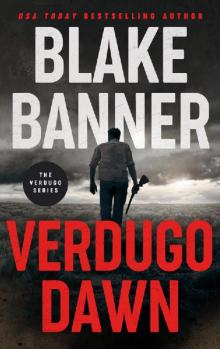 Verdugo Dawn
Verdugo Dawn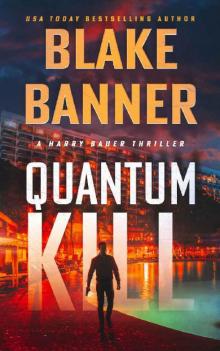 Quantum Kill (Cobra Book 4)
Quantum Kill (Cobra Book 4)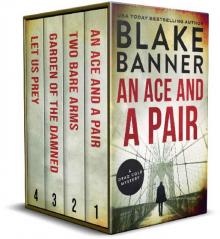 Dead Cold Mysteries Box Set #1: Books 1-4 (A Dead Cold Box Set)
Dead Cold Mysteries Box Set #1: Books 1-4 (A Dead Cold Box Set)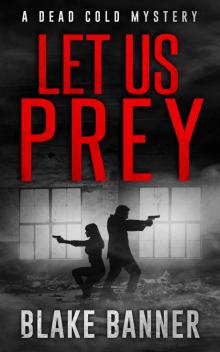 Let Us Prey
Let Us Prey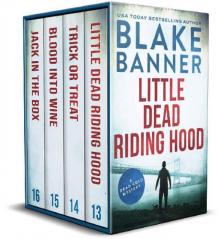 Dead Cold Mysteries Box Set #4: Books 13-16 (A Dead Cold Box Set)
Dead Cold Mysteries Box Set #4: Books 13-16 (A Dead Cold Box Set)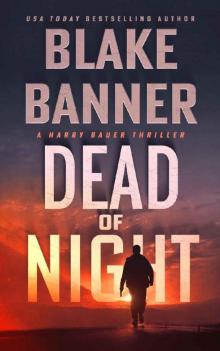 Dead of Night
Dead of Night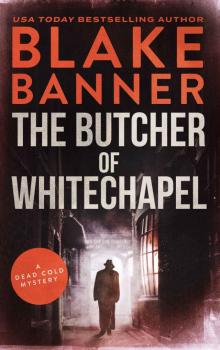 The Butcher of Whitechapel: Dead Cold Mystery 12
The Butcher of Whitechapel: Dead Cold Mystery 12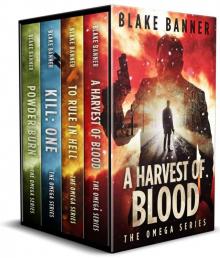 Omega Series Box Set 2
Omega Series Box Set 2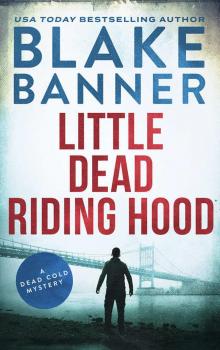 Little Dead Riding Hood: Dead Cold Mystery 13
Little Dead Riding Hood: Dead Cold Mystery 13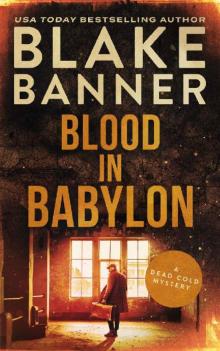 Blood in Babylon
Blood in Babylon Powder Burn
Powder Burn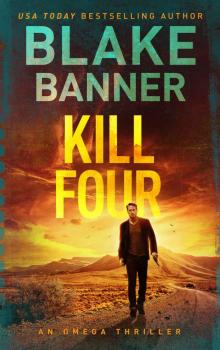 Kill Four
Kill Four Omega Series Box Set 3
Omega Series Box Set 3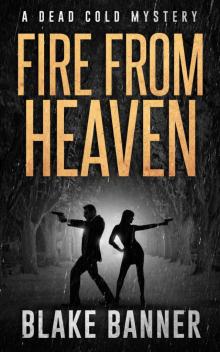 Fire From Heaven: Dead Cold Mystery 9
Fire From Heaven: Dead Cold Mystery 9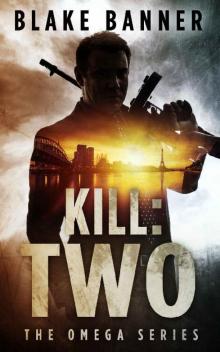 Kill - Two
Kill - Two Omega Series Box Set 1
Omega Series Box Set 1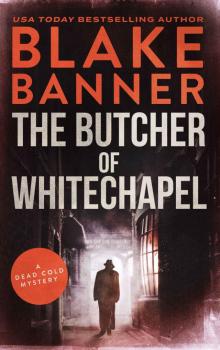 The Butcher of Whitechapel
The Butcher of Whitechapel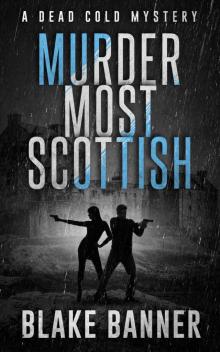 Murder Most Scottish
Murder Most Scottish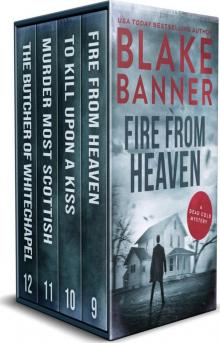 Dead Cold Mystery Box Set 3
Dead Cold Mystery Box Set 3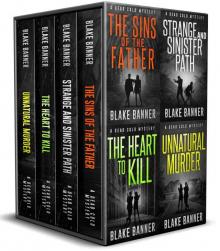 Dead Cold Mysteries Books 5-8
Dead Cold Mysteries Books 5-8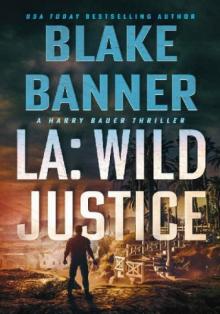 LA
LA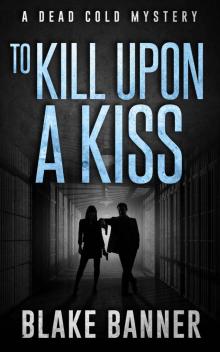 To Kill Upon A Kiss: Dead Cold Mystery 10
To Kill Upon A Kiss: Dead Cold Mystery 10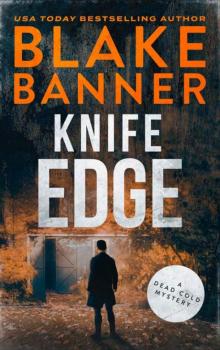 Knife Edge (A Dead Cold Mystery Book 27)
Knife Edge (A Dead Cold Mystery Book 27)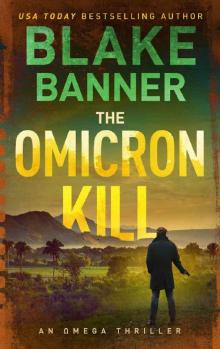 The Omicron Kill - An Omega Thriller (Omega Series Book 11)
The Omicron Kill - An Omega Thriller (Omega Series Book 11)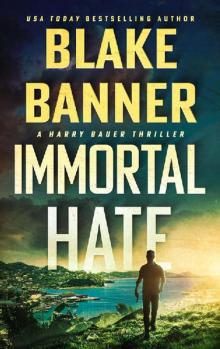 Immortal Hate (Harry Bauer Book 5)
Immortal Hate (Harry Bauer Book 5)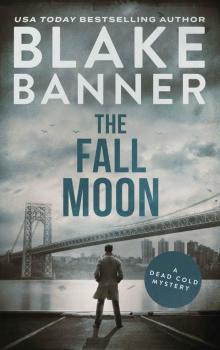 The Fall Moon
The Fall Moon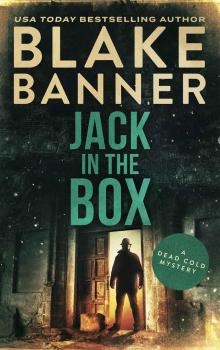 Jack in the Box
Jack in the Box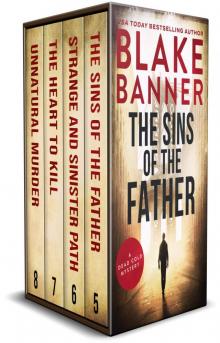 Dead Cold Mystery Box Set 2
Dead Cold Mystery Box Set 2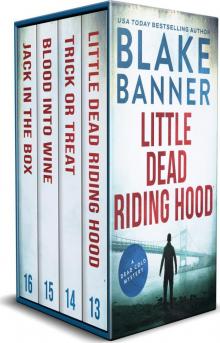 Dead Cold Mystery Box Set 4
Dead Cold Mystery Box Set 4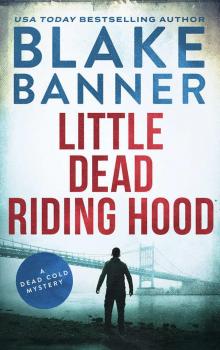 Little Dead Riding Hood
Little Dead Riding Hood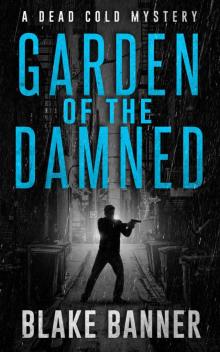 Gardened of the Damned
Gardened of the Damned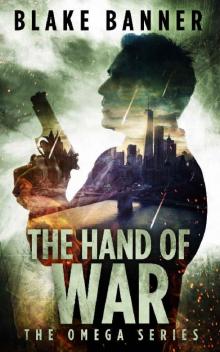 The Hand of War
The Hand of War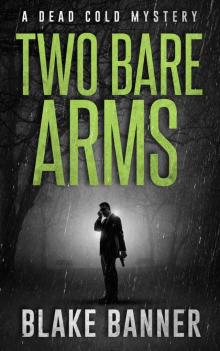 Two Bare Arms
Two Bare Arms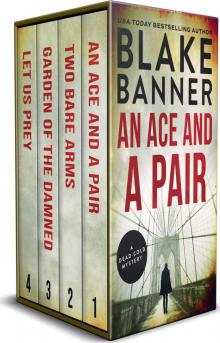 Dead Cold Mystery Box Set 1
Dead Cold Mystery Box Set 1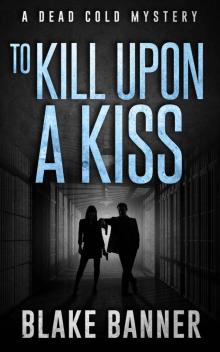 To Kill Upon A Kiss
To Kill Upon A Kiss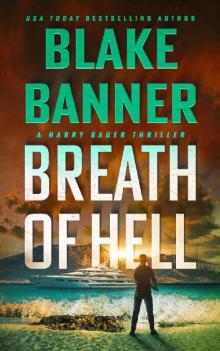 Breath of Hell (Harry Bauer Book 8)
Breath of Hell (Harry Bauer Book 8)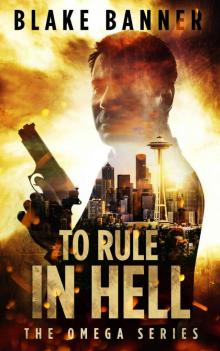 To Rule in Hell
To Rule in Hell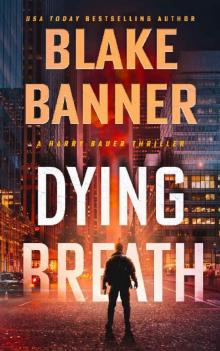 Dying Breath (Cobra Book 2)
Dying Breath (Cobra Book 2)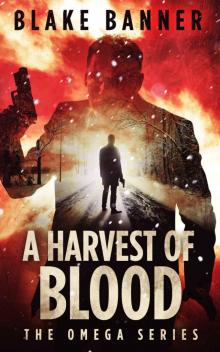 A Harvest of Blood - An Action Thriller Novel (Omega Series Book 5)
A Harvest of Blood - An Action Thriller Novel (Omega Series Book 5)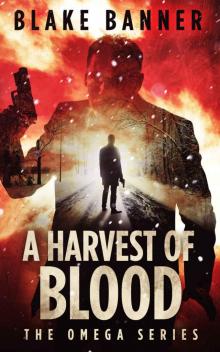 A Harvest of Blood - An Action Thriller Novel
A Harvest of Blood - An Action Thriller Novel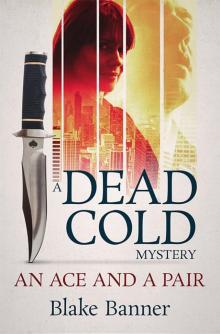 Ace and A Pair: A Dead Cold Mystery (Dead Cold Mysteries Book 1)
Ace and A Pair: A Dead Cold Mystery (Dead Cold Mysteries Book 1) Omega Series Box Set 3: Books 8-10
Omega Series Box Set 3: Books 8-10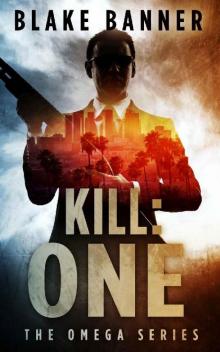 Kill One_An Action Thriller Novel
Kill One_An Action Thriller Novel The Storm
The Storm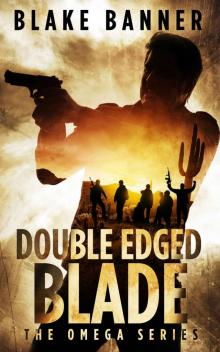 Double Edged Blade
Double Edged Blade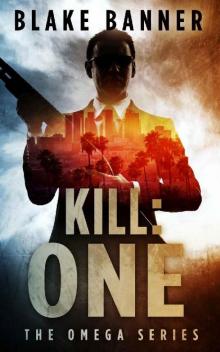 Kill: One - An Action Thriller Novel (Omega Series Book 7)
Kill: One - An Action Thriller Novel (Omega Series Book 7)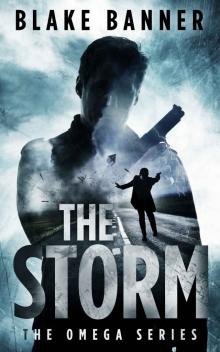 The Storm - An Action Thriller Novel (Omega Series Book 3)
The Storm - An Action Thriller Novel (Omega Series Book 3)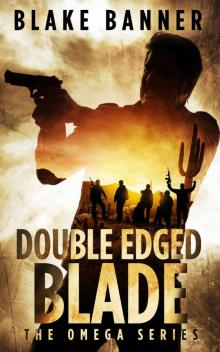 Double Edged Blade - An Action Thriller Novel (Omega Series Book 2)
Double Edged Blade - An Action Thriller Novel (Omega Series Book 2)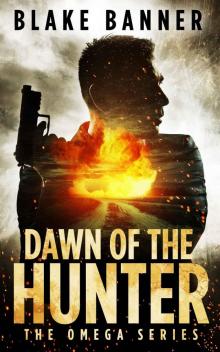 Dawn of the Hunter
Dawn of the Hunter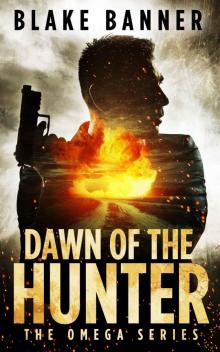 Dawn of the Hunter - An Action Thriller Novel (Omega Series Book 1)
Dawn of the Hunter - An Action Thriller Novel (Omega Series Book 1)